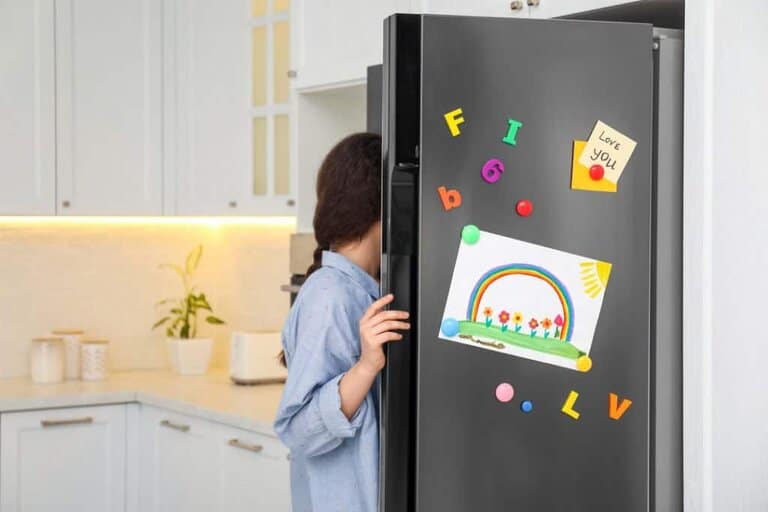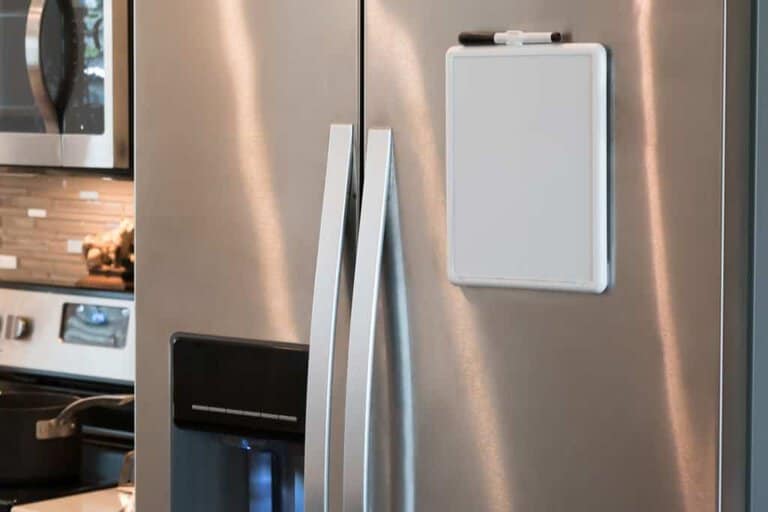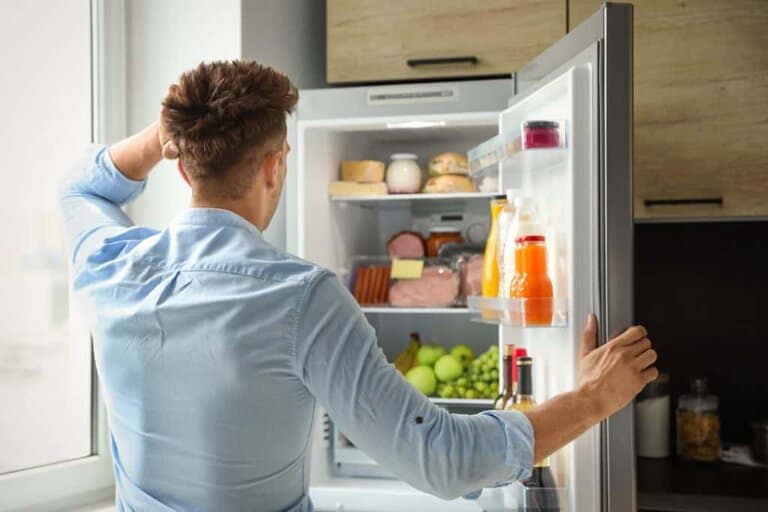The gaskets on refrigerator doors are laced with magnetic strips that shut the door automatically when it’s open, stopping cold air from escaping. The doors will also close automatically due to gravity if your refrigerator is tilted backward.
If you often experience your refrigerator door closing automatically, you might think you’re living in a horror movie, but it’s actually quite a common phenomenon.
Most refrigerators today have modern doors that are light, close slowly, and are equipped with features that automatically shut them.
There are several reasons why this happens, which I’ll walk you through in this article. And you’ll also find out how to stop your refrigerator doors from closing unexpectedly every time you need to use them.

How Refrigerator Door Designs Have Changed Over The Years
Before now, old refrigerators had handles that opened and closed manually; however, they weren’t perfect. As a result, several injuries and casualties were recorded, which eventually led to the refrigerator safety act of 1956 being passed in the USA.
The new refrigerator design act mandated all refrigerator manufacturers to design refrigerators so that you can open them from the outside and inside. So, over the years, refrigerators have seen a lot of modifications, and some of them are what make your refrigerator door close automatically.
Let’s dive deeper into these modern refrigerator features and how they make your refrigerator close automatically.
What Makes The Refrigerator Door Close Automatically?
Certain handy features allow your refrigerator to close the door itself. Some models even allow you to adjust the amount of time between closing the door and when the refrigerator turns on.
Below are two modifications that make this modern refrigerator feature possible.
Magnet-laced Gasket
Many refrigerators are designed with a sealed gasket to prevent hot air from entering the refrigerator and cold air escaping through the door cracks, thereby preserving the food at appropriate temperatures.
This gasket is often laced with a magnetic strip. So, when your fridge door is near its frame, the magnetic strip automatically pulls the door towards it, and the sealed gasket keeps the door shut to stop cool air from escaping the refrigerator.
Tilted Placement
Manufacturers now adjust the front legs of modern refrigerators by a few degrees. This makes your refrigerator slightly tilted towards the back, so it takes advantage of gravity, allowing it to slam shut automatically.

So, Do All Modern Refrigerators Close Automatically?
Ideally, most modern refrigerators are designed to have their doors close automatically to keep our food safe if we fail to do so ourselves. However, if you notice your newer models not closing automatically, there are underlying issues you need to troubleshoot.
Here are a few reasons why your refrigerator door may not close automatically and how to fix them.
Five Reasons Why Your Refrigerator Door May Not Close Automatically
Dirty Gasket
A dirty gasket can limit its efficiency in closing the refrigerator door automatically and keeping cold air locked in. So you should always keep the gasket clean to maintain its sealing properties.
To clean your gasket;
- Make a cleaning solution (1 part vinegar and 1 part water).
- Then dip a toothbrush or sponge in the solution and use it to wipe down the gasket.
- Lightly dry with a paper towel.
- Also, ensure you check the seal for tears. If you notice any, it may be time to change your gasket.
Worn Out or Unaligned Door Hinge
Door hinges help your refrigerator door swing freely, which is essential in helping the door close automatically. Sometimes, this door hinge may experience rust or be out of place because of a loose screw. This limits the free-swinging of the door, requiring more force to close the door.
To adjust the hinges;
- Get a screwdriver and tighten the loose screws.
- As you tighten the screws, study the hinges and your fridge mechanism to determine your refrigerator door’s best level.
- Keep adjusting the upper and lower hinges until your refrigerator is well balanced and swings smoothly.
Worn Out Gasket
The importance of the sealed gasket in maintaining the temperature of your refrigerator cannot be overemphasized. However, sometimes the constant opening and closing of the refrigerator can wear out the gasket. A worn-out gasket will require force to close the refrigerator and should be sorted out as soon as possible.
To fix this
- Simply replace the worn-out gasket.
- It’s best to have a professional help you out.
Wrong Placement
If your refrigerator is not level, the door may not close automatically. Many people tilt the front of their fridge slightly upwards to aid easy closing. However, if the fridge’s surface is not level, gravity may cause the refrigerator to tilt in the opposite direction, making it harder to close the door.
To fix this:
- Use a bubble level to determine how balanced your refrigerator is standing.
- If it’s not level, adjust the refrigerator feet to favor a tilt of its front area upwards.
Heavy Items
We often keep Items like the milk gallon, can of beer, or ketchup in the refrigerator door compartment for easy access and to keep them from getting frozen.
Whatever the case, these heavy items can stop your refrigerator door from closing. Their weight will put pressure on the door hinges and limits its free-swinging
What Happens If Your Refrigerator Does Not Close Properly?

High Energy Bills
The refrigerator is a closed system, and it is impossible to maintain a constant low temperature if the doors are not closed. Leaving the refrigerator open for too long means the compressor must work harder and use more energy to keep the refrigerator at a food-safe temperature.
Increased Cooling Time
While the damage of leaving the refrigerator door open is not instant, it would gradually impact the efficiency of the compressor, thereby leading to a longer cooling time. You may also have to spend more money refilling your gas than usual.
Food Spoilage
Your refrigerator’s food-safe temperature is 40 degrees Fahrenheit. Leaving its door open spikes the temperature higher than 40 degrees, which is the suitable for bacteria growth that causes food spoilage
Does Your Refrigerator Door Close Too Early?
Let’s face it; it’s great to have a fridge that closes automatically. However, it can be frustrating when you have to open your refrigerator door many times within a short period. Especially when you are restocking,
Below are some simple tips to help keep the door open a little longer
Keep The Door Wide Open
If you want to keep your fridge open for a while as you restock, it’s best to open the door all the way. The design of most refrigerator doors is such that it closes automatically when opened slightly, but this is different when the door is opened wider.
Block The Door
This method is straightforward: whatever your reason for wanting your refrigerator door to stay open, simply use an object to stop the door from closing automatically. For example, place an item like a wedge, milk gallon, or bottle of soda in the door’s path to prevent it from closing.
Adjust The Balance Screws
If you plan on keeping the refrigerator door open for a long time, perhaps for cleaning or repairs: you can adjust the screw of the refrigerator doors. Raising the back legs will also allow it to tilt forward against gravity. This will limit the door’s gravitational pool, stopping it from closing automatically.
FAQs On What Makes The Refrigerator Door Close Automatically
Can I Remagnetize The Refrigerator Door Seal?
You can remagnetize the seal by using strong magnets alongside the gasket. However, this is just a temporary solution, and if not done correctly, you may end up demagnetizing the entire seal. Therefore, it’s always best to replace the gasket entirely.
Can My Refrigerator Door Get Stuck?
Yes, your refrigerator door can get stuck due to the significant air pressure difference between the inner part of the generator and the outside. In addition, problems with the cams, gears, or door hinge bushings can cause the door to freeze.